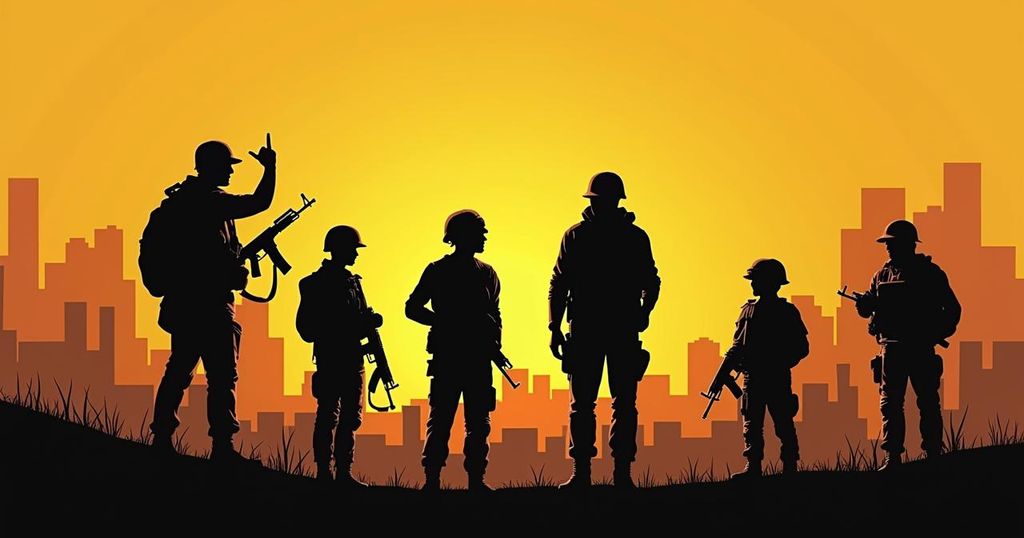Jordanians show divided opinions on Hezbollah, yet they unite in their condemnation of Israeli assaults on Lebanon. This divergence in opinion is shaped by historical ties and contemporary political dynamics, especially as protests reflecting both support for the Lebanese people and opposition to Israeli actions continue to gain momentum in Amman. Despite governmental silence on certain issues, the streets are poised for a display of solidarity against perceived injustices by Israel, echoing larger regional dissent.
In Jordan, public sentiment exhibits division regarding support for Hezbollah, yet a unified opposition prevails against Israeli actions in Lebanon. Over the last weekend, an uncharacteristic calm settled over the square outside al-Husseini Mosque in downtown Amman. This area, previously vibrant with pro-Palestinian protests following the onset of Israel’s offensive on Gaza, witnessed subdued activity attributed to widespread shock and despair stemming from the recent escalation in hostilities affecting Lebanon. Ahmed, a local shopkeeper, reflected on this atmosphere, indicating that the recent death of Hassan Nasrallah, the leader of Hezbollah, has impacted public sentiment significantly, although he anticipates a resurgence of anger manifesting in protests following Friday prayers. Despite the division of public opinion regarding Hezbollah, there remains substantial solidarity among Jordanians with the Lebanese populace. In the backdrop of their ongoing concerns about Israel’s military activities, many Jordanian citizens, represented by individuals like Hussein Amer, emphasize that protests are more focused on opposing Israel’s continued aggression rather than expressing direct support for Hezbollah, particularly due to the latter’s previous support for the Syrian government in the ongoing civil war. Young protesters, including Mohammed Telwiy, have expressed tacit solidarity with victims of Israeli attacks, regardless of their editorial stance on Hezbollah. These concerns were echoed across the demographic spectrum, as voiced by Omer Yaseen, highlighting a consensus that views Israel’s actions as unjust, irrespective of individual political interpretations of Hezbollah itself. Jordan’s government, functioning under a precarious diplomatic balance, has vociferously condemned Israel’s military actions. Foreign Minister Ayman Safadi articulated this stance during a UN Security Council meeting, stressing the necessity of halting Israeli escalation to avert broader regional conflict. He has been vocal in stating Jordan’s position concerning Israel’s disregard for Lebanese sovereignty while the country facilitates humanitarian assistance for Palestinians confined in Gaza. Amidst macro-political maneuvering, the sentiment among average citizens hints at a growing impatience, particularly among those with historical ties to Palestinian displacement. While Jordanian authorities have remained mostly silent on ongoing Israeli aggressions, public demonstrations remain a powerful display of discontent, emphasizing the critical need for justice and peace in the region.
The ongoing conflict between Israel and Hezbollah has reignited discussions surrounding political allegiance and resistance narratives in Jordan. Historically, support for Hezbollah in Jordan has swayed, influenced by the group’s involvement in regional conflicts, particularly in Syria. Nevertheless, recent escalations in violence against Lebanon and Gaza have prompted a wave of protests among Jordanians, indicative of their broader sympathy towards fellow Arab nations in the face of Israeli military action. The complexity of Jordan’s relationship with Israel, framed by diplomacy, historical grievances, and the socio-political makeup of its population, shapes the current public sentiment. This political scenario presents a challenging landscape for Jordan’s government, trying to navigate reconciliation with Israel while addressing rising anti-Israeli sentiment among its citizens, particularly considering the significant Palestinian demographic within Jordan. As tensions escalate in Lebanon, the public mood suggests a potential resurgence of collective activism, underscoring the interconnectedness of regional issues and national sentiments.
In conclusion, Jordanian society finds itself at a pivotal crossroads; citizens display diverging views on Hezbollah yet converge in their condemnation of Israel’s military aggressions. The recent developments have sparked a renewed sense of urgency and solidarity among Jordanians for regional stability and justice. The Jordanian government’s diplomatic challenge lies in balancing international relations with the prevailing public sentiment, which increasingly favors support for the Arab cause against perceived colonial aggression. As protests evolve, it reflects not only a reaction to current affairs but also a historical context of resistance and identity within the Jordanian populace.
Original Source: www.aljazeera.com






